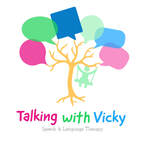Speech Sounds Development Advice
It is often hard to learn to make all the sounds needed to form words. It is normal for the first attempts at words to be said incorrectly. Children then learn to perfect their speech until they can be understood by unfamiliar adults by the time they start school. This process can sometimes go wrong and children need support to develop their speech sound system.
A formal assessment will determine which speech sounds your child is finding hard and critically at what point in the process something has gone wrong e.g. your child might be able to make the sound by itself but not know when the sound is needed in a word or they might have good sound knowledge but be unable to form the correct lips/tongue/teeth positions to make the sound physically.
Stages of therapy
A child has to be able to hear the difference between sounds. Speech sounds are very similar to a child’s untrained ear and they have to learn the distinct differences between sounds and be able to identify them.
They also need to learn when these sounds are needed in words. They have to learn that the word ‘cat’ has three distinct sounds which blend together to make the word.
They need to develop the ability to make the sound by itself. This involves very slight and intricate movements of the tongue, teeth and lips.
Once they can hear the subtle differences between sounds, have learnt to identify when these sounds are needed in words and can make the sound by itself, they need to learn to blend this sound with a series of vowel sounds. This is the start of forming words.
They will then start to use these sounds in simple real words followed by more complex longer words and at different places in words.
The final stage is being able to use the sounds in short phrases and then in everyday talking.
Each stage can take time to master and children need to be motivated to correct their talking for change to take place. Some stages will be relatively easy for your child whilst others can take many months to master.
- Try to reduce the use of dummies during the day and if possible at night. Children learn to use the muscles for speech during the day and night. If they are starting to have difficulties speaking they need lots of time to practice the movements of their tongue and lips to practice making sounds. Both the use of a dummy and the sucking of fingers/thumbs can impact teeth formation however children with dummies tend to keep them in their mouths when playing, whereas children who suck their fingers/thumb often remove them from their mouths to play, reducing the impact this has on their speech.
- Arrange for your child’s hearing ability to be checked professionally.
- Try to stay patient when you child continues to make speech mistakes and try not to ‘over-correct’ your child.
- Repeating incorrect pronunciation back to your child will often reinforce the incorrect speech. They are doing their best and might not be able to hear the difference. Always use accurate versions of the words your child is attempting yourself, for them to copy.
- If you are finding it hard to understand what your child is trying to say then use phrases such as ‘sorry I am not sure what you mean, can you show me’ rather than ‘you need to say the right sounds so I can understand you’.
- Always respond to what your child is saying not to how they have said it.
- Change will take time.
- Lots of practice is needed at each stage of therapy.
- Only work on correcting 1 or 2 sounds at a time.
- Playing games can make the repetitive task of changing speech more engaging.
A formal assessment will determine which speech sounds your child is finding hard and critically at what point in the process something has gone wrong e.g. your child might be able to make the sound by itself but not know when the sound is needed in a word or they might have good sound knowledge but be unable to form the correct lips/tongue/teeth positions to make the sound physically.
Stages of therapy
A child has to be able to hear the difference between sounds. Speech sounds are very similar to a child’s untrained ear and they have to learn the distinct differences between sounds and be able to identify them.
They also need to learn when these sounds are needed in words. They have to learn that the word ‘cat’ has three distinct sounds which blend together to make the word.
They need to develop the ability to make the sound by itself. This involves very slight and intricate movements of the tongue, teeth and lips.
Once they can hear the subtle differences between sounds, have learnt to identify when these sounds are needed in words and can make the sound by itself, they need to learn to blend this sound with a series of vowel sounds. This is the start of forming words.
They will then start to use these sounds in simple real words followed by more complex longer words and at different places in words.
The final stage is being able to use the sounds in short phrases and then in everyday talking.
Each stage can take time to master and children need to be motivated to correct their talking for change to take place. Some stages will be relatively easy for your child whilst others can take many months to master.
N.B. This advice is only to be used alongside therapy and with support and guidance from a Speech and Language Therapist.
Email Address: talkingwithvicky@gmail.com

